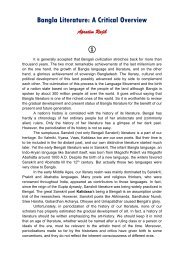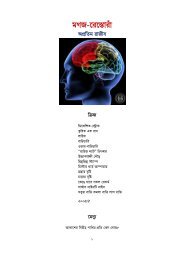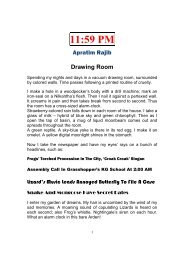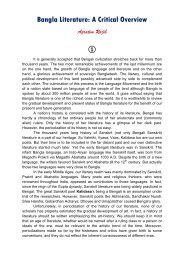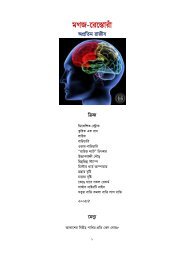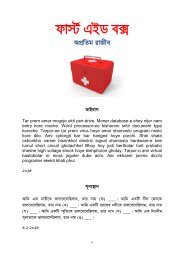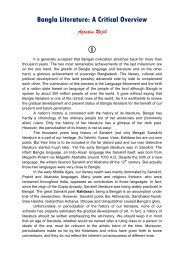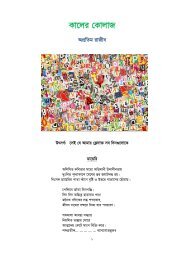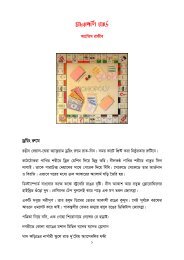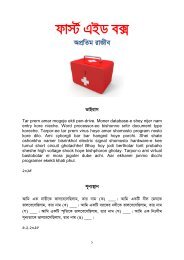Literature-Critique
You also want an ePaper? Increase the reach of your titles
YUMPU automatically turns print PDFs into web optimized ePapers that Google loves.
45<br />
Is free of weariness<br />
And that is why<br />
Flat out on the table in the morgue<br />
Defeated, he will lie.”<br />
(Translated by Fakrul Alam)<br />
But despite all filthiness of life and the world, he himself wishes to survive and to<br />
engage himself to temporal existence. “Adim Devatara” (“The Primitive Gods”) is<br />
another poem that tells us the worthlessness and repetitiousness of prevailing<br />
subject-matters of art like beauty and love.<br />
Sathti Tarar Timir (The Darkness of Seven Stars) is Jibanananda’s most<br />
complex poetical work. In “Akashleena” (“The Sky-Suffused One”), the very first<br />
poem of the collection, he sees how love has turned to a matter of mere<br />
consummation in the modern world. But here the deceived narrator’s love for the<br />
beloved is also merged with his love for the whole planet. Another poem titled<br />
“Godhulisandhir Nritya” (“The Dance of Twilight”) shows the transition period of warinflicted<br />
civilization.<br />
Bela Abela Kalbela (Time: Good, Bad and Awesome) is his last unique<br />
collection of poems in lifetime, which is also tinged with philosophical thoughts.<br />
The great poet’s masterpiece is but Rupashi Bangla (The Beautiful Bengal)<br />
that was published posthumously. Here he longs for a gorgeous Bengal that has in<br />
course of time, faded and fallen in an awesome crisis due to turmoil and dissection.<br />
Some of his good poems were published in an anthology titled Shrestha<br />
Kabita (Best Poems). Especially memorable is “1946-47” where Jibanananda<br />
expresses his deep anguish at the communal riots between Hindus and Muslims and<br />
the partition of our motherland. Here he utters some words of hope –<br />
“And yet man continues to move on even now,<br />
From blinding despair to pleasing darkness,<br />
From total darkness to festivities marking the founding of new cities and villages,<br />
Surmounting the sources of errors and sins in his soul,<br />
Staying within the orbit of consciousness seemingly on his own merit.”<br />
(Translated by Fakrul Alam)<br />
Jibanananda’s poems possess an innate consciousness about women, which<br />
had a precursor in Sarat’s novels. His poems tell us of the catastrophe of love in the<br />
modern world.<br />
If Tagore is called a modern Romanticist, Jibanananda must be called a<br />
romantic Modernist.<br />
His poems bear the mark of townsmen’s nostalgia for country-life and nature<br />
from what they’ve been alienated.<br />
There is a sham accusation against him; it is that he just copied many of his<br />
poems from English and other Western literatures which, I sternly say, is an insulting<br />
infamy. I have matched his poems with those of the western poets who are called his<br />
‘preceptors’ and have found that he just assimilated those. Now if assimilation is a<br />
sin in the world of art, then all literary artists including Shakespeare must face<br />
posthumous penalty.<br />
In merit, Jibanananda stands next to Tagore in modern Bangla poetry. His<br />
accidental death did not let him achieve the supremacy in poetry. A critic (Abdul



